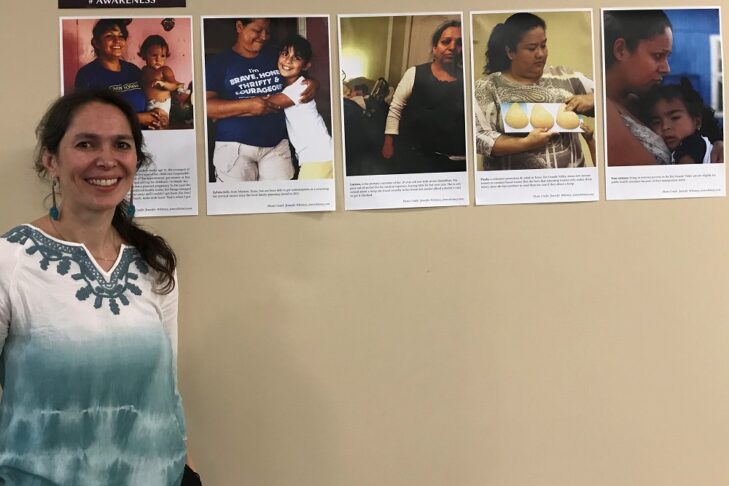“People’s reproductive health is directly linked to the conditions in their community,” shared Cyntia Barzelatto. As a parent-child clinician for the Early Connections/Conexiones Tempranas program at JF&CS, Cyntia has seen the struggle for reproductive health access firsthand.
“Many of our clients, particularly women of color and other marginalized groups, experience systematic barriers to accessing contraception, comprehensive sex education around family planning, alternative birth options and culturally sensitive health care and mental health services,” said Cyntia.
To help shine a spotlight on these pressing issues, Cyntia is educating herself and her colleagues at JF&CS about reproductive justice. Through Cyntia’s presentations and multimedia displays, our staff members are learning more about how reproductive oppression impacts our clients and how we can better support the families we serve.
Looking Through the Lens of Reproductive Justice
Through the Early Connections/Conexiones Tempranas program, Cyntia provides child-parent psychotherapy to Spanish-speaking families with young children. Many EC/CT clients have experienced sexual trauma, rape and community and intimate partner violence. “These experiences negatively affect their reproductive and emotional health and may become the prism through which they make decisions regarding their bodies and family planning,” explained Cyntia. “Additionally, these experiences often impact the quality of their relationship with their children.”
For Cyntia, the best way to understand the reproductive health issues and sexual trauma facing EC/CT clients is through the lens of reproductive justice. The term “reproductive justice” integrates the concepts of reproductive rights, social justice and human rights. At the heart of the reproductive justice framework is the idea that reproductive injustices are the result of intersecting systems of oppression based on race, gender, immigration status, national origin, ability, sexuality, class and other identities. “Reproductive justice centers the discussion around reproductive health and rights on the most marginalized populations and works toward the dismantling of structural injustices,” said Cyntia.
In addition to her work with EC/CT clients, Cyntia also delved into the concept of reproductive justice as part of the Infant Mental Health Fellowship she is working on through the Infant-Parent Training Institute at JF&CS. “After studying this topic and becoming increasingly aware of its relevance for the women we serve, I considered it important and timely to share with my colleagues what I had learned,” said Cyntia.
Sharing Knowledge With JF&CS Staff
In the past few months, Cyntia has organized two presentations about reproductive justice for her colleagues in the JF&CS Center for Early Relationship Support®. During the first session, Cyntia talked about the history and origins of reproductive justice, the core principles of reproductive justice and how different communities experience different reproductive injustices. The presentation was followed by an insightful group discussion about the challenges women face in achieving autonomy over their reproductive health and how this affects maternal mental health and caregiver-child well-being.
For her second presentation, Cyntia curated a multimedia exhibition about reproductive justice and facilitated a group discussion with her CERS colleagues. The exhibition combined work created by artists, activists, advocates, international movements and NGOs, among others. After the group discussion, JF&CS staff members from around the agency were invited to visit the exhibition. Cyntia also hung up a number of reproductive-justice related posters in the office so staff and clients can educate themselves on the topic.
“I think having visual materials help us better register and remember the concepts,” said Cyntia. “In fact, I think part of the positive reception to the exhibition was due in great part to its graphic nature. People not only appreciated having graphic materials but having different types—graphic art, video, photographs—as everyone experiences learning differently.”
Cyntia has found that her colleagues were very receptive to learning more about reproductive justice. She believes a reproductive justice lens may help her and her colleagues think about the struggles their clients face in new ways. “Adopting a reproductive justice lens requires a holistic understanding of the daily lives of our clients,” said Cyntia. “This includes considering the broader socio-cultural-historical context and becoming aware of the multiple systems of oppression that affect them every day.”
Cyntia’s presentations have kickstarted a conversation on these issues, and she looks forward to future discussions and collaborating with her colleagues to create and put into practice more actionable knowledge.
Learn more about our Early Connections/Conexiones Tempranas program.
This post has been contributed by a third party. The opinions, facts and any media content are presented solely by the author, and JewishBoston assumes no responsibility for them. Want to add your voice to the conversation? Publish your own post here. MORE


